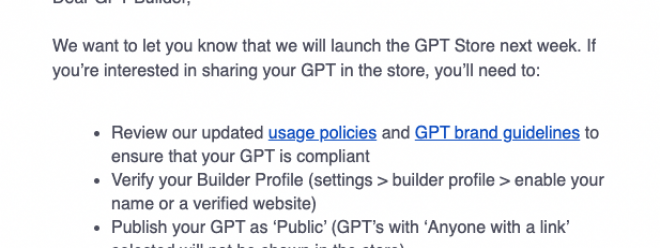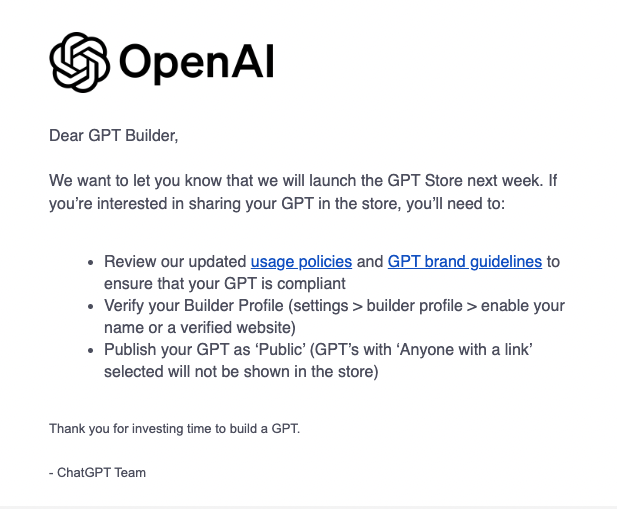OpenAI GPT store plans to launch next week

OpenAI seems ready for 2024.
The company behind ChatGPT, and arguably the company most responsible for bringing GenAI to the masses, is preparing to launch its GPT store, and creators of third-party custom GPTs built using OpenAI’s new GPT Builder can start next week — January 2024. 8th to 13th to sell their apps and earn money.
OpenAI has sent an email to those who have created and launched custom GPTs through GPT Builder, including the author of this article, with the following text:
Dear GPT Builder:
We wanted to let you know that we will be launching the GPT store next week. If you are interested in sharing your GPT in the store, you need to:
Review our updated usage policy and GPT branding guidelines to ensure your GPT compliance.
Verify your Builder profile (Settings > Builder Profile > Enable your name or verified website).
Publish your GPT as 'Public' (GPTs with 'Anyone with a link' selected will not show up in the store).
Thank you for taking the time to build GPT.
——ChatGPT team

No specific release date, time, region, or user availability was given, and an OpenAI spokesperson simply responded to our inquiry: "Thank you for reaching out. We'll have more to share here next week."
What is a GPT store? Why is it so hyped?
First unveiled by Altman, CEO and co-founder of OpenAI, and his colleagues at OpenAI’s DevDay developer conference in November, the GPT Store was introduced as a place on the ChatGPT website for those using OpenAI’s tools. People who build earn money while sharing their apps with a wide audience.
You'll need to use OpenAI's GPT Builder to build a custom GPT on top of OpenAI's underlying, powerful large language model (LLM) GPT-4, but doing so is relatively simple and straightforward, especially compared to programming other software.
OpenAI's GPT Builder allows you to enter in simple language the functions you want your GPT to provide, and it will attempt to create a simplified version of ChatGPT to perform those functions on your behalf or any other user you share your GPT with. This can be done using a shared link or soon. Come to the store to complete.
It immediately brings to mind the success of Apple's launch of the App Store for the iPhone in the summer of 2008, and subsequent iPad and Mac devices - which generated trillions of dollars in annual revenue for third-party developers and, of course, Apple itself, It takes a 30% cut of all sales, and it has been the target of antitrust lawsuits from the likes of Epic Games, though it has largely weathered those lawsuits so far.
However, like the Apple App Store, OpenAI's GPT store is not without controversy.
OpenAI initially promised to launch it by the end of 2023, but caused huge drama after the former board of directors of the nonprofit it controlled briefly fired Altman, only to eventually rehire him.
All this confusion, along with the excessive focus on GPT Builder and the reported DDoS attack on OpenAI servers, may slow down the rollout of the GPT store.
Key questions remain
But when the OpenAI GPT store finally launches, the key question will be: How much of a cut will OpenAI take from custom GPT sales/subscriptions?
Equally important: What pricing options and mechanisms will they allow, how much will developers be able to charge, and will it become the App Store for the AI era?
The OpenAI GPT Store already has an advantage over other third-party software stores: it doesn't require a developer account or any software experience to participate, all it requires is an idea and a way to enter it into ChatGPT Builder , of course, also requires a subscription to OpenAI’s ChatGPT Plus or Enterprise Edition, which starts at $20 per month.